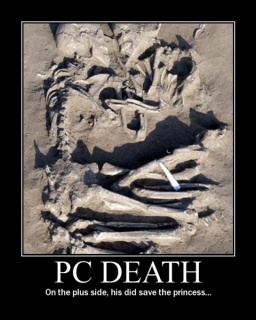Blog Archives
Player Agency & Death, Part 1
Posted by Bobby Archer
Last week, I wrote about Player Agency and the social contract that it implied between the GM and the players. In case that post didn’t make it clear, I find player agency, particularly the gradient between complete player freedom and strict railroading, to be immensely interesting. This one thing effects just about every aspect of this hobby, but generally gets relegated to a terse, binary debate. I’d love to see more open discussion and exploration of how this agency scale affects the different aspects of roleplaying.
 |
| Today’s topic |
I suppose that’s all just my way of saying that I’m going to keep coming back to this idea until I run out of excuses. Hopefully, I don’t bore my meager readership into non-existence before I run out of permutations.
Today, I’m gonna belabor the connection between player agency and death. Since I’ll be talking about particular games I’ve been involved in, all allowances and disclaimers apply.
Read the rest of this entry →
Player Agency & the Social Contract
Posted by Bobby Archer
There’s a column on the Escapist that I’ve been following pretty much since it started appearing there: Check for Traps. The guy behind it, Alexander Macris, has some really neat ideas about running a game. I’m currently (very slowly) designing a campaign using a lot of his advice. There is one of his ideas, though, that I think may be a little more complex than he’s made it out to be.
This idea is his Agency Theory of Fun. Don’t worry, I won’t make you follow the link if you don’t want to. This theory is Macris’ answer to the prevailing opinion that the Gamemaster’s job is to make sure everyone has fun. He argues that many GMs are afraid to give their players real choices because, if things go poorly, it could ruin their players’ fun. But that has the unforeseen consequence of making none of the players’ choices matter, which isn’t fun.
In its place, he states the GM should prioritize their role as a judge, arbitrating the rules of the game fairly and consistently. By risking the various catastrophes a bad roll can cause, the players’ choices have meaning, and making meaningful choices leads to fun.
Frankly, this is the type of game I love to play in, but it isn’t for everyone. I’ve met some people who would absolutely hate this style of game. And there are reasons beyond fun maintenance why the other type of game gets run.
Read the rest of this entry →